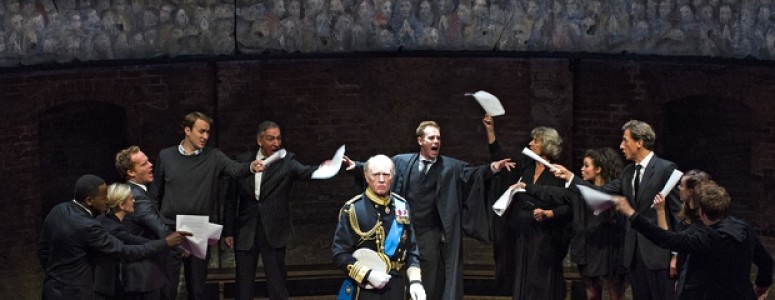Yes, KING CHARLES III has been on Broadway since October.
But there are only two weeks left to see it.
And you mustn’t miss this extraordinary drama.
Playwright Mike Bartlett begins his epic work with the funeral of Queen Elizabeth II, which he sees happening about a decade from now. At that point, The Prince of Wales would immediately become the first King Charles in more than 350 years.
He’d also be in his late seventies.
These days, no matter what the profession, you’ll hear someone complain “We gotta get someone young in here!” And if there’s one thing Charles won’t be even if his mother passes tomorrow, it’s young.
Needless to say, Charles has been waiting a l-o-n-g time to ascend to the throne; technically, if the Queen had died in 1966 when he’d reached 18 and was thus of age, he would have then become the monarch of all England surveys. If that had happened, Charles would have been hearing “Long live the king!” for almost a half century now.
But he hasn’t, and one has to wonder if decades of doing comparatively nothing has prepared him for nothing. Charles does fully admit to having an “indecisive mind,” and even in a country where the crown is a figurehead, one expects more from a king.
So when Elizabeth does go to meet her presumed maker, will the Prime Minister and Parliament be happy with him on the throne? Will Charles even want it?
These are thorny questions that would be enough for any two-and-a-half-hour drama, but Bartlett decided to be even more ambitious. Given that Shakespeare routinely wrote about British kings in history – one John, two Richards and four Henrys – Bartlett decided to write in the style of The Bard.
So we have a play in blank verse. You can subtly feel it (under Rupert Goold’s unmannered direction), although the workaday prose takes over when the commoners speak – and they do have their say in plenty of scenes.
That’s because Prince Harry (the endearing Richard Goulding), is a latter-day Prince Hal who hangs around with commoners. He’s a scandal waiting to happen, thanks to his penchant for sex and drink. En route, Harry takes a shine to Jess, a wild-haired, down-to-earth type who isn’t fazed by his so-called regal heritage. (Tafline Steen has the right sauciness for the part).
Jess’ insouciance and matter-of-factness is, of course, what makes her so attractive to the young prince. We see that his not being a commoner has resulted in his not having much common sense.
Much more interested in matters of state are Prince William (the stately Oliver Chris) and the former Kate Middleton, now Catherine, Duchess of Cambridge (the authoritative and yet enigmatic Lydia Wilson). Whether Bartlett is being fair to Kate by making her a minor Lady Macbeth is questionable, but the characterization does make for some arresting drama.
Actually, there are plenty of Shakespeare parallels in the text. While you don’t have to be an expert in The Bard’s works to appreciate KING CHARLES III, there’s no question that you’ll have more fun if you are indeed familiar with them.
You’ll find a little Falstaff in Jess. HAMLET comes to mind, too, for Charles has a few out-and-out soliloquies; a ghost shows up from time to time; and Harry and a Chef engage in a conversation that’s reminiscent of the one Hamlet has with the Gravedigger.
Before all is said and done, KING CHARLES III may remind you of KING LEAR as well. Even Tom Scutt’s set is reminiscent of the type of stage on which we usually see Shakespeare these days. All we see is a semi-circular brick wall with nothing specifically defined.
There’s an occasional Shakespearean-flavored line — Harry doesn’t say that he wishes someone would “escape me from this life” but “‘scape me from this life.” Most of the time, however, Bartlett gives us standard-issue contemporary English, be it Harry’s “I think I might quit my job” or Camilla’s “Harry, we don’t see enough of you.”
Tim Pigott-Smith is magnificent as Charles, characterized as a mama’s boy who’s suddenly required to grow up in a hurry. That’s hard for a man who says that royalty is famous for “keeping our emotions to ourselves.” Pigott-Smith shows how Charles might well waver under the circumstances, pulling rank when he’s displeased or threatened, but gratefully taking advice when he’s flummoxed (which happens quite a bit). At the theater next door to where Jean Valjean has been singing for the last two years “Who am I?” here at the Music Box Charles actually asks aloud “What am I?” Pigott-Smith lets us see the difficulties the man has in trying to answer the question.
KING CHARLES III also deals with a famous expression: “A boy does not become a man until he can beat up his father.” Mike Bartlett could be said to have written a latter-day THE LION IN WINTER, but in fact he’s trumped that ace by penning an even better play. Get to the Music Box before it’s gone.




